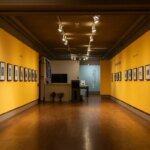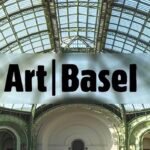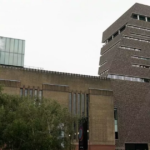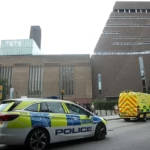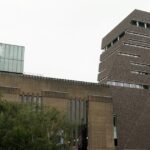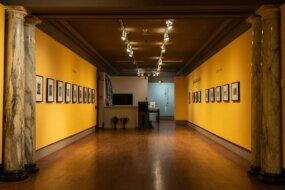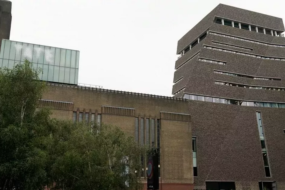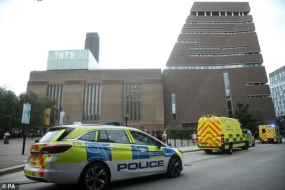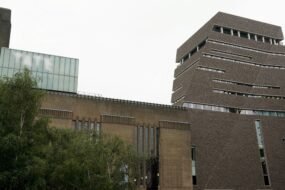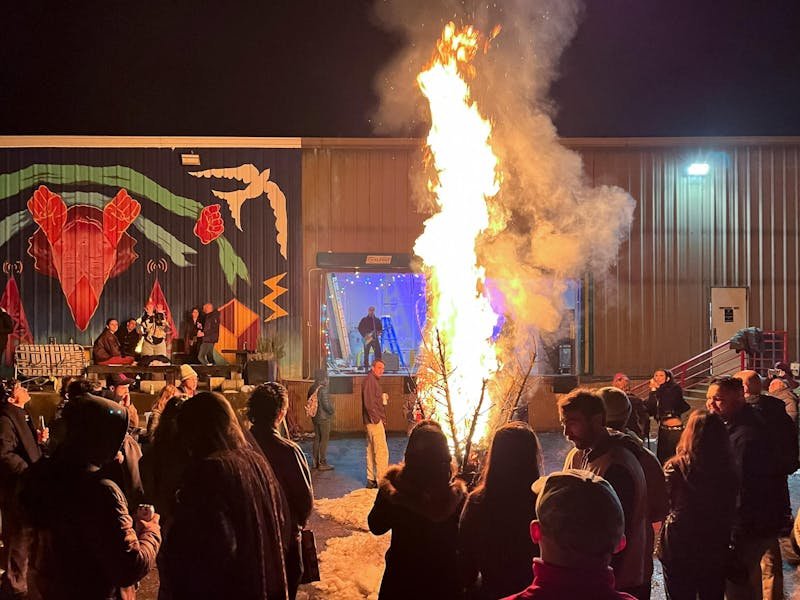
Tucked away in the Belmont neighborhood of Charlottesville, a former data warehouse has been transformed into an affordable artist-run gallery and studio space. Opened in 2021, Visible Records was created with the goal of providing both central Virginians and global artists with 24-hour studio access, community programming and artist residencies.
Visible Records acknowledges the way in which the development of previously industrial spaces into expensive housing, retail and restaurants has contributed to the affordable housing crisis. To address this, the studio aims to center the intersection of visual art and social justice movements in a variety of affordable, diverse spaces.
These spaces include a community garden and a Little Free Fridge — a 24/7 fridge and pantry space where everyone is welcome to take what they need and leave what they do not. The fridge is stocked with produce from Common Field and Solitary Gardens, along with food donated from community members. Visible Records also hosts events like film screenings, grill-outs and a bi-weekly community potluck.
Morgan Ashcom, founder and director of Visible Records, also leads the Exhibitions Committee for Visible Records in an effort to build an important third space for Charlottesville residents and nurture a sense of local community and longevity.
“People who have met in the community garden [can] go on to participate in letter writing nights, then collaborate on creating an exhibition,” Ashcom said. “Going through long-term projects together helps everyone grow. It’s not always easy, there is rupture and repair along the way, but ultimately it makes our community stronger. Building that strength is the best form of resistance.”
Visible Records is an important part of the greater Charlottesville community in many other ways, offering plenty of opportunities for anyone who would like to come and visit the space, including University field trips. First-year College student Noah Gibson visited the space with his AMST 4210, “Refugee Aesthetics” class and was impressed with the studio’s unique approach to storytelling that shines light on subjects often overlooked.
“One thing that stood out to me about my time at Visible Records was seeing a community interest in preserving history in a nontraditional way. All throughout the space there are artifacts of historical events and community movements that tell a history that is not projected by mainstream media,” Gibson said.
Artist and costume designer Annie Temmink has worked in Visible Records studios for multiple years, and the experience of creating in a community-engaged space has enhanced her work by giving her the opportunity to connect and collaborate with other artists.
“I’m continually given opportunities to engage with new people and to hear new perspectives. It’s refreshing and human to exist and create in a space like this. It makes me feel very lucky,” Temmink said.
Another example of this emphasis on community is Visible Records’ collaboration with jackie sumell, an artist who has been educating the public for decades on prison abolition by working on projects that help give incarcerated people agency. sumell installed four Solitary Gardens in their Common Field community garden, each the shape and scale of a standard solitary confinement cell commonly used all over the United States.
The plants, flowers and herbs grown in the Solitary Garden Beds are curated by prisoners who are currently serving their sentences in isolation. The gardens are intended to link the solitary prisoners to the outside world, allowing them to create a space of their own outside of the prison through written communication.
“The use of these cells constitutes a moral atrocity that we all have a duty to end,” Ashcom said. “This project has been taken on by the community here for years and remains a defining project.”
As a complement to the Solitary Gardens Project, Melissa Gilrain and the Rivanna Anarchist Black Cross — a political prisoner support group — run letter writing nights that occur on the second Thursday of the month at Visible Records, where anyone is welcome to write a letter to one of the Solitary Gardeners or other political prisoners. This project, like many of the others at Visible Records, uses art to build community and compassion while fighting for social justice.
“Art and movement work can invite us to imagine and build new futures. Sometimes the exhibitions, workshops or residencies we host explicitly blend movement work and art, and sometimes they occur alongside one another,” Ashcom said. “So much of this programming is community driven and we see abundant possibilities in creating an environment where all of this mixes together.”
Other community building programming includes poetry critiques, gardening, music events and film screenings, alongside special events that can be found on the Visible Records website. Upcoming events include an open mic style abortion storytelling, a Solidarity Screening of “The Prison in Twelve Landscapes” and a grill out in The Common Fields Garden.
Additionally, their new immersive exhibition, “seeds of connection: dreams of freedom,” invites audiences to listen closely to the voices and dreams of those impacted by the criminal legal system, in collaboration with the Philadelphia-based multidisciplinary abolitionist project The People’s Paper Co-op. “the seeds of connection” exhibit will be running until May 31.
On top of the community programming and affordable studio space for local artists available at Visible Records, they also host a recommendation-based residency program that invites artists from around the world to join Visible Records in Charlottesville for up to a month. They provide residents with a private studio and cozy airstream living space on-site, as well as covering travel, food, a small material budget and weekly stipend and have had over 20 artists participate in the program so far.
Joumana Altallal, a past resident at Visible Records, curated a solo exhibition of artwork by Iraqi visual artist Ali Eyal, complete with paintings, performances, conceptual pieces that tied into a broader story.
“He’s a serious artist with a lot going on in his career, but after being in residence at Visible Records for a month, he told us he wanted to grill fish for everyone at the opening of his exhibition,” Ashcom said.
Eyal’s interest in building community reflects how Visible Records is focused on a complete integration of art and social justice into daily life — benefiting both artists and Charlottesville residents to create a completely unique space.
“The community and environment inspired [Eyal], but that’s not something you’ll find at a typical gallery,” Ashcom said.
But of course, Visible Records is not a typical gallery.

